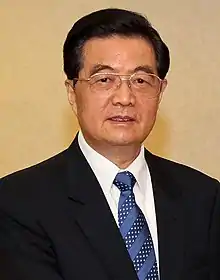| |||||||||||||
36 Hong Kong deputies to National People's Congress | |||||||||||||
|---|---|---|---|---|---|---|---|---|---|---|---|---|---|
| Registered | 956 | ||||||||||||
| |||||||||||||
| |||||||||||||
The election for the Hong Kong deputies to the 10th National People's Congress (NPC) was held on 3 December 2002. 36 Hong Kong deputies were elected by an electoral college.
Background
Article 21 of the Hong Kong Basic Law stipulates:
Chinese citizens who are residents of the Hong Kong Special Administrative Region shall be entitled to participate in the management of state affairs according to law. In accordance with the assigned number of seats and the selection method specified by the National People's Congress, the Chinese citizens among the residents of the Hong Kong Special Administrative Region shall locally elect deputies of the Region to the National People's Congress to participate in the work of the highest organ of state power.
An electoral college composed of the following:
- Members of the previous electoral college that had elected the Hong Kong deputies to the 9th National People's Congress;
- Hong Kong delegates of the 9th Chinese People's Political Consultative Committee (CPPCC);
- Members of the Election Committee (which elects the Chief Executive) who are Chinese nationals, except those who opt out; and
- The Chief Executive of the HKSAR.
Election result
54 of the 78 candidates were pre-elected on 29 November 2002 and 36 of the 54 candidates were elected on 3 December. It was presided by Tung Chee-hwa, executive chairman of the 15-strong presidium.[1] Five pro-democrats who contested in the election, Albert Ho, James To, Sin Chung-kai, Anthony Cheung and Frederick Fung were defeated in the heavily pro-Beijing electoral college. The Liaison Office was accused of issuing a recommendation list to the electors before the election.[2]
Elected members (36)
- Robin Chan
- Cheng Yiu-tong
- David Chu Yu-lin
- Rita Fan Hsu Lai-tai
- Fei Fih
- Ip Kwok-him
- Kan Fook-yee
- Ko Po-ling
- Lam Kwong-siu
- Priscilla Lau Pui-king
- Joseph Lee Chung-tak
- Allen Lee Peng-fei
- Lee Chark-tim
- Lee Lin-sang
- Sophie Leung Lau Yau-fun
- Lo Suk-ching
- Ma Fung-kwok
- Ma Lik
- Ng Ching-fai
- Ng Hong-mun
- Ng Leung-sing
- Sik Chi-wai
- Victor Sit Fung-shuen
- Maria Tam Wai-chu
- Tsang Hin-chi
- Tsang Tak-sing
- Tso Wung-wai
- Wang Rudeng
- Carson Wen Ka-shuen
- Wong Kwok-kin
- Peter Wong Man-kong
- Philip Wong Yu-hong
- Wilfred Wong Ying-wai
- Raymond Wu Wai-yung
- Yeung Yiu-chung
- Yuen Mo
Supplementary members (16)
- Peter Chan Chi-kwan
- Raymond Chien Kuo-fung
- David Fang
- Fung Chi-kin
- Raymond Ho Chung-tai
- Bernard Hui Man-bock
- Stanley Ko Kam-chuen
- Dennis Lam Shun-chiu
- Leung Ping-chung
- Lo Chung-hing
- Ma Ho-fai
- Ngai Shiu-kit
- Wong Po-yan
- Wong Siu-yee
- Wong Yuk-shan
- Howard Young
Controversies
The Liaison Office was criticised for meddling in the election; it was accused of issuing a recommendation list to the electors before the election. James Tien of the Liberal Party criticised the Liaison Office for circulating the recommendation lists, the Democratic Party's Martin Lee viewed it as a "shadow government" meddling in elections in all levels, including the Chief Executive elections, coordinating with pro-Beijing parties in Legislative Council and District Council elections,.[3]
References
- ↑ "港区第十届全国人大代表选举产生(36名代表名单)". China News. 3 December 2002.
- ↑ Lo, Sonny Shiu-hing (2008). The Dynamics of Beijing-Hong Kong Relations: A Model for Taiwan?. Hong Kong University Press. p. 193.
- ↑ Lo, Sonny Shiu-hing (2008). The Dynamics of Beijing-Hong Kong Relations: A Model for Taiwan?. Hong Kong University Press. p. 193.

